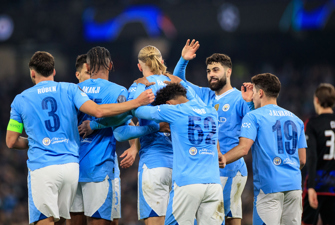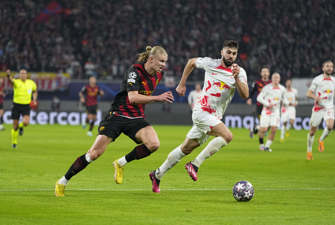Water through a sieve: The rise of untraceable power in football's MCO era
From LA to Lausanne, billionaires, private equity, and secretive funds have created a web of influence across clubs in structures that are too fluid to follow and too complex to regulate.
It is difficult to track the extent to which multiple-club ownership (MCO) has become one of the main models of ownership in 21st-century club football because most of the relationships between the entities involved in it remain hidden from the general public.
Some of the most visible MCO structures - say the City Football Group (CFG), the biggest of them all - appear simple enough. A single entity, in this case, the Abu Dhabi United Group, directly controls ten clubs and has substantial minority stakes in two more in a total of twelve countries, with Manchester City FC at the top of the pyramid.
The same goes for Mexico's Grupo Pachuca, which controls seven clubs in Spain and Latin America, Jim Ratcliffe's INEOS group (Lausanne-Sport, OGC Nice, and Manchester United), or Miami-based 777 Partners, which, until recently, owned five clubs in Europe and South America in full (or near enough) and held equity in Sevilla FC and Melbourne Victory FC before crashing spectacularly.
These entities may have minority partners, such as the US investment fund Silver Lake, which holds an 18% stake in CFG, for example, but there is no doubt in anyone's mind who is in the driving seat. If only things always were that simple. But they are not.
The rise of investment funds in football
An added layer of complexity and opacity is provided by the growing involvement of groups, most of them US-based, which are routinely described as "investment funds. This catch-all category refers to organisations that differ wildly in terms of structure and ambitions.
Some, like Chelsea FC's and RC Strasbourg's majority owner Clearlake Capital, are long-established private equity firms that have decided to diversify their portfolios by acquiring football assets. To them, sport is another field in which to invest money entrusted to them by investors whose identities are most often hidden or unknown.
Who was aware, for example, that the Saudi state was a "major investor" in Clearlake Capital and, therefore, indirectly, in Chelsea FC (despite already owning Newcastle United FC, a direct rival of the London club in the Premier League) before this was revealed by a Daily Mail investigation?
Others, like Arctos Partners, specialise in sports and were set up with the sole objective of providing a "private equity platform dedicated to the professional sports industry and sports franchise owners".
Arctos Partners raised billions from investors unknown to regulators
With Arctos Partners, things become very complicated indeed, to the degree that it is difficult to see how the regulators who are tasked with controlling MCO's impact on sporting integrity can do their job properly.
To start with, there is not 'one' Arctos, but two: Arctos is not a company. It is a two-phased, single-purpose investment vehicle, which is not the same thing at all. Fund number one was created in 2020, raised 2.9 billion US dollars, and made a total of twenty-five investments, only a minority of which were made public.
Fund number two was launched a year later and closed in 2024 and was described by Business Wire as "the largest pool of institutional capital dedicated exclusively to the asset class of professional sports".
It had exceeded its original target by 1.6 billion US dollars, and according to Business Wire, it raised "4.1 billion USD in capital commitments from a diverse group of global investors, including some of the world’s leading pension funds, retirement systems, endowments, insurance companies, family offices and global wealth platforms".
Who are those investors? The management team of Arctos knows their names, but we don't. All we know is that, in the course of four years, Arctos acquired significant stakes in some of football's best-known clubs, something which the fans of these clubs will have no idea about and which may have also escaped the regulators' attention:
- One of these clubs is Paris Saint-Germain, in which Arctos acquired a 12.5% share from their "strategic partner" Qatar Sports Investments (QSI) in December 2023.
- In Italy, the 2024 UEFA Europa League winners, Atalanta BC, are in fact co-owned by Arctos through their 55% stake in the club's holding company, La Dea, even though the club is routinely described in the media as owned by US billionaire Steven Pagliuca.
- In the United States, Arctos partnered with billionaire founder of "experience management company" Qualtrics, Ryan Smith, and multi-club owner David Blitzer to acquire Real Salt Lake.
- Arctos also purchased 15% of one of Real Salt Lake's direct rivals in MLS, Portland Timbers, something which went unreported for a whole year.
And that is not all.
In June 2022, Arctos also took a stake in HBSE (Harris Blitzer Sports & Entertainment), part-owner of the Premier League Crystal Palace FC, just as they had previously bought a 5% slice of Fenway Sports Group (FSG), whose most prized possession, at least in Europe, is Liverpool FC.
PSG, Atalanta, Real Salt Lake, Portland Timbers, Crystal Palace and Liverpool. Not bad for an entity which has only existed for five years.
MCO can lead to cigar clubs of semi-formal and informal agreements
If this was not complicated enough, there is yet another layer to be added to the strata of MCO, which is not laid just vertically (X controls Y, which controls Z, and so on), but horizontally as well.
MCO is an interconnective model in which a community of interests and existing personal and business relationships can lead to semi-formal or even informal agreements between separate entities, something which a high-ranking European police official investigating sports-related criminality described as a "cigar club" to Play the Game.
In that context, the links are even trickier to identify, but that does not make them less real. Drawing a global, exhaustive map of these entanglements is almost impossible, given their circumstantial nature and how the parties involved keep most of the information confidential.
What is possible, however, is to pick an example of one of those web-like arrangements, knowing that it is only one of many similar set-ups. Pulling one string by going through company registries and statements published in specialist business media leads to surprising places and gives a far better (if confusing} idea of what the current landscape of MCO is.
MCO structures are fluid with many tentacles
Let's take little-known Swiss MCO company, Core Sports Capital AG (CSC), which was founded in 2020 by Ahmet Schaefer, a former personal assistant of then FIFA president Sepp Blatter who also worked for now-bankrupt marketing rights company MP & Silva.
CSC is the majority owner (97%) of French Ligue 2 club Clermont-Ferrand 63 and owns stakes of respectively 25% and 33% in SC Austria Lustenau (Austrian second division) and FC Biel-Bienne 1896 (Swiss second division). So far, nothing remarkable about this.
However, CSC is also a "strategic partner" of the JMG Academy, the network of eleven academies set up by former French international Jean-Marc Guillou in six African countries as well as Belgium, Thailand and Vietnam. Cape Town Spurs (formerly known as Ajax Cape Town) is another "strategic partner", and so is the Red & Gold Academy, a joint venture of FC Bayern München and one of MCO's most tentacular entities, Los Angeles FC (LAFC).
At this point, the rabbit hole becomes a veritable warren.
The extended reach of LAFC, who played their first-ever Major League Soccer (MLS) game only seven years ago, is vertigo-inducing. The Californian MLS franchise owns 100% of Swiss institution Grasshopper Club Zürich and of Austrian third division club FC Wacker Innsbruck. So far, so simple.
But LAFC, as one half of Red & Gold, is also a "strategic partner" (most often a euphemism for "shadow investor") of Racing Club de Montevideo in Uruguay and Gambinos Stars of Gambia.
Meanwhile, LAFC director and co-owner Ruben Gnanalingam is also co-chairman of London club Queen's Park Rangers. One of his LAFC co-owners, Barnett Rosenthal, is the co-founder of Ares Management, a private equity fund which has invested in - a deep breath is required at this stage - Atlético de Madrid, Chelsea, Inter Miami and, through their participation in John Textor's Eagle Football Holdings, RWD Molenbeek (Belgium), Botafogo (Brazil), Crystal Palace (England) and Olympique Lyonnais (France).
Bruce Karsh is a co-owner of Los Angeles FC, and he is also the co-founder and co-chairman of Oaktree Capital Management who took over ownership of Italian football champions Inter Milan in 2024. (Photo: Visual China Group / Getty Images)
It does not end there. Another co-owner of LAFC, Bruce Karsh, is the co-founder and co-chairman of Oaktree Capital Management, which seized control of Italian champions Internazionale after its Chinese owners failed to repay a 400 million euro loan in time.
The network extends beyond that through John Textor's co-ownership of Palace with David Blitzer (him again) which adds a number of independently-owned Blitzer clubs to the mix: GD Estoril Praia (Portugal), Augsburg (Germany), ADO Den Haag (Netherlands), AD Alorcon (Spain), SK Beveren (Belgium, with historic links to the JMG Academy), Brondby IF (Denmark) and Real Salt Lake (USA, co-owned by Arctos, as we've seen).
Every single relationship leads to another one and every single path leads to a destination from which other paths begin, which often cross the ones already travelled.
The point is that MCO should not be thought of as a rigid, structured, chartable model following established rules, but rather as a generic concept whose main characteristic is fluidity and, as such, almost impossible to regulate.
Water cannot be carried in a sieve. This is one of its main attractions for the investors, good, indifferent or too often bad, who have flocked to football and can play the game without ever showing a full hand.



